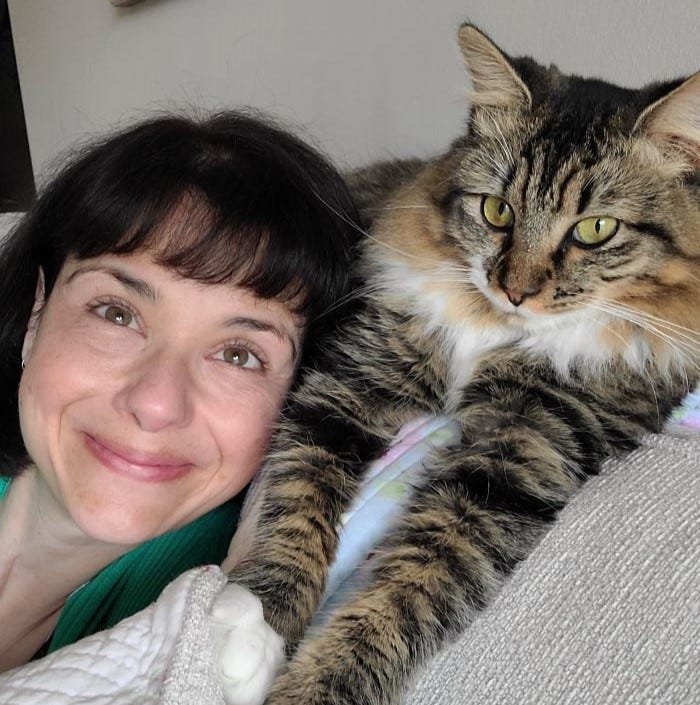Real Cats
A personal essay about a lifelong kinship with a species persecuted for its association with "autonomous women."
I read the line three times. “Throughout history, cats have suffered for their association with autonomous women.” I read the line three times, because I did not know that there was any other kind.
This was before a man urged me to discard the ashes under my bed. I felt clumsy trying to respond. “I loved Molly.”
“But you don’t need to keep her ashes. The box is kind of big.”
I promised to “find a place for” the cherry box. “I know the ashes aren’t ‘her.’” I felt the need to say it. “But it honors her. It holds space for her. She lived.”
“If you say so.”
I still spoke then, six months married with a full tank of feline. My steps were protected. Siamese cats draped across my shelves, a canopy of wary angels.
My mother found Tao in her college bookstore. She hid her fever under bangs, gripping the edge of the desk and the hem of heaven’s garment. She had the flu, but it was six days before Christmas and eighteen days after her only child was diagnosed with Type 1 diabetes. I was “brittle.” They called it “the bad kind.”
She found a life-sized Siamese cat with a crooked ear between Abnormal Psychology textbooks and licensed sweatpants reading NEW PALTZ across the buttocks. She collapsed in class, and her professor put the cat back in her arms. She put the cat in my arms. I promised I would keep Tao forever.
My mother found the twins in a fancy gift shop that smelled like vanilla. We could not really afford to shop there, but I was turning ten. They enfolded each other, all legs and reverence. They felt life so intensely, it turned their snouts and tails the color of twilight. They played “Memory” every time you wound the music box. They wished me a happy birthday. They were “chocolate-point” Siamese. The upright one looked like my mother if her eyes were blue.

I studied animal welfare and repudiated meat at eleven. My grandmother bought a second wooden spoon for my humane marinara. My mother did not lament the task of keeping both blood sugars and my moral compass from spinning.
I rescued strays. I wrote an essay on how the Rolling Stones’ “Under My Thumb” was a masterwork of misogyny. The line about “a little Siamese cat of a girl” was ludicrous. Cats were not Labrador retrievers. Cats were never fully domesticated. Their brains were more similar in structure to humans than canines. They chose our company as it suited them.
Siamese were at the sharp end of the bell curve. They were apex predators with eyes like seraphs. They were fierce lovers. They did not love everyone. They did not usually end up in shelters. I got an A+. My mother bought me a T-shirt reading “Anonymous Was A Woman.”
Real cats led to a career in cats. Bawdy angels guffawed all the way. I went to seminary, sweat heavily in the pulpit, and got hungry enough to walk into a drop trap. The next thing I knew, I was the Development Director for a cat sanctuary.
A nihilistic Siamese lived on my desk and screamed expletives. Molly had no teeth but made many wrists bleed. She had come to the shelter because she was fragile. She was beside herself at all times, bilocating to a state of grace. I learned to stroke her third eye when she was exasperated. She loved me a solid 70% of the time. She was an apex predator until she died.
My favorite volunteer gave me a book on French cats, where I read the line: “Throughout history, cats have suffered for their association with autonomous women.”
I went home and told the living, plush, and musical cats. We toasted each other and my mother.
This was before I married the man from the internet. This was before I gave up my black tutu because I was “not twenty-six anymore.” This was before I found myself holding a greasy caveman club that had once been a living bird’s leg. I took and ate.
“Chicken is good for you.” The man pet me, words smoothing my bangs.
I felt like a betrayer. I felt something like a tail wagging my treacherous body. Approval reached my vein. It hit stronger than nausea and dignity.
He never suggested I surrender Tao, though he over-wound every music box my mother gave me. He said she was a dotard. I put the twins in the care of the ashes. I stationed Tao between knick-knacks that crinkled, so I would hear bells if she was being moved. I wrote Christmas fundraising appeals about how a cat sanctuary is a parable of every creature feeling its worth.
Strangers thanked me for reminding them that they are as valuable as cats. A volunteer gave me a notebook with a Siamese on a stack of books, aflame with eye contact. “Your words heal,” she wrote on the first page. “They are psalms. Please never stop writing.”
A friend from college sent a parcel. I hadn’t seen Abbie in decades. She was a geology major on a full scholarship. I fell face-down into anthropology only because the religion department scared me. When I was spastic with fear that my mother would die, we would meet in the campus coffee shop, and Abbie would listen to me cry until they stopped serving tea. I didn’t tell her that I offered God my lifelong singleness if he would let my mother outlive me. We hugged at graduation and wished each other twenty happy birthdays across time zones.
Today was not my birthday. She sent batik notecards made by women in Nepal. The proceeds freed teenagers from traffickers. “I have no idea why, but you need these. Don’t use them as cards. Frame them on your wall. I feel strongly about this. Let me know.” They were Siamese cats with gaudy smiles, magenta and indigo with chocolate noses. They were apex predators.
I wrote her a thank-you card. I wrote that I had just realized that women are expected to pluck their eyebrows up until the day we are expected to draw them back on. “This is relevant. Just put up with me, like you always have.”
I did not tell her that I loved it when I caught my mother before she drew on the day’s eyebrows. Sometimes I would video-call her early just to get a glimpse of her seventy-year-old face, before she bilocated back to forty-five with pencils and spells.
I told Abbie I did not trust the Rolling Stones. I told her to update her address book with my maiden name.
I told my father-in-law that I wasn’t going to eat ribs anymore. His son shook the Honda with rage. “They are diabetic-safe. They are pure protein. There is no reason you can’t eat them.”
“I have preferences just like anyone else.”
“The ribs won’t hurt you.”
“That’s not the only criterion.”
His eyes were blue, but his pupils engulfed them. “If you’re not going to eat what they serve, there’s no point in your coming to family events.”
I felt my own eyes as doleful as a retriever’s, but my chest filled with unlawful relief. “Family events” were radioactive. My fat paws could never keep balance on the balcony rail. I had been warned, “if I ever hear you using one of your third-order vocabulary words in front of my working-class family, I’m going to flip out.” I had been schooled in “communal eating,” the imperative to accept anything that wouldn’t raise my blood sugar. I was already too brittle for the best things on the table. I had been escorted back into the house to remove my shag neon jacket in favor of something appropriate.
I watched him leave for the Fourth of July and bought myself a bag of sugar-free chocolate. I took out the music boxes. I threw away my tweezers. I transferred the cats’ adoption contracts into my birth name. I called my mother. She cried until I got her to laugh about eyebrows. I promised I would not surrender the way. I wrote a poem about how apex predators do not need to tear flesh.
Angela Townsend graduated from Princeton Seminary and Vassar College. She is a three time Best of the Net nominee and the 2024 winner of West Trade Review’s 704 Prize for Flash Fiction. Her work appears or is forthcoming in Arts & Letters, CutBank, Pleiades, SmokeLong, and Terrain, among others. Angela has lived with Type 1 diabetes for 34 years, laughs with her poet mother every morning, and loves life affectionately.
In Other News
Our fall writing group starts October 4th. Join a group of midlife women writing together for three weeks. Learn more and sign up HERE.
We’ve added more Substack publications by midlife writers to our Midstory Directory.
Have a Substack or thinking about starting one? Join us for our first Midstack workshop on Monday, September 30th at 1 p.m Eastern. Learn more HERE.





Incredible essay
This is gorgeous. What a gifted writer you are. Thanks for sharing it 🤗